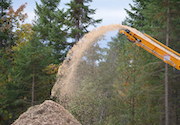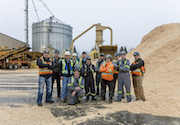| |
| |
| |
 |
|
@{mv_date_MMM d, yyyy}@ |
|
| |
Canada’s forest sector harvests less than one per cent of Canada’s commercial forests each year. The wood pellet sector uses less than 0.04 per cent of Canada’s annual forest harvest, using the portion of the forest that has been rejected by the other traditional forest sectors.
» Read more...
The government plans to invest almost $83 million into IFIT to help strengthen the forestry sector by bridging the gap between new product development and commercialization and $13 million into IFI to support Indigenous peoples’ participation in forestry opportunities.
» Read more...
The Dutch Social and Economic Council’s suggestion that the Netherlands phase out the use of biomass for heating and electricity goes against scientific evidence. The UN IPCC has recognized the significant GHG mitigation potential of biomass – as much as 80 to 90 per cent – provided that it is developed sustainably and used efficiently.
» Read more...
The results of proper maintenance can yield a well-running, efficient and safe fines collection system (baghouse) that will enhance productivity and plant uptime. Cariboo Biomass Consulting’s Kevin Ericsson shares some best practices.
» Read more...
Supported by government funding, Atlantic Grown Organics is testing two Herz Energietechnik BioFire boilers’ ability to handle more than wood alone, but a mixture incorporating local oilseed byproducts from crambe and meadowform crops.
» Read more...
|
| |
 |
 |
| |
|
| |
 The B.C. government is currently renewing its bioenergy strategy, but as of right now, this strategy will exclude the use of solid biofuels for heat. WPAC is urging the provincial government to reverse this exclusion given the industry’s role in reducing wildfire risk, improving air quality, and reducing GHG emissions.
» Read more...
The B.C. government is currently renewing its bioenergy strategy, but as of right now, this strategy will exclude the use of solid biofuels for heat. WPAC is urging the provincial government to reverse this exclusion given the industry’s role in reducing wildfire risk, improving air quality, and reducing GHG emissions.
» Read more... |
| |
 Canada needs to tap into its biomass resources to recover from COVID-19. To do so, the country needs a new approach that de-risks bio-project development and investment. According to Ecostrat president and CEO Jordan Solomon, Bioeconomy Development (BD) Zones can do this quickly.
» Read more...
Canada needs to tap into its biomass resources to recover from COVID-19. To do so, the country needs a new approach that de-risks bio-project development and investment. According to Ecostrat president and CEO Jordan Solomon, Bioeconomy Development (BD) Zones can do this quickly.
» Read more... |
| |
|
| |
|
|
| |
| |




